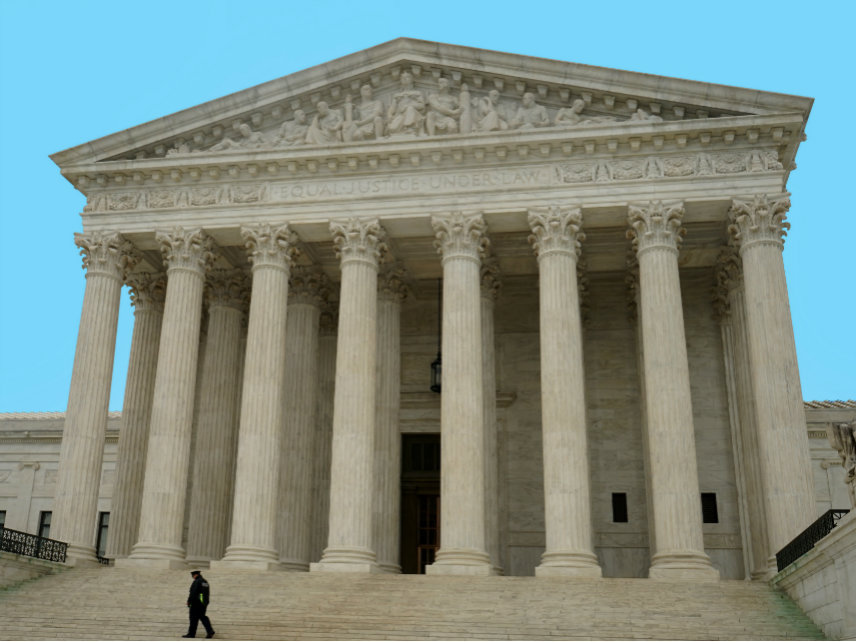The Supreme Court Will Hear Two Big Criminal Justice Cases Later This Year
The Court could strike a major blow for civil asset forfeiture reforms in the states and finally do away with an awful double jeopardy loophole.

Later this year, the U.S. Supreme Court will hear oral arguments in two important criminal justice cases with the potential to limit abuses of civil asset forfeiture and close a loophole in the constitutional prohibition of double jeopardy. Here are the important details.
Timbs (and a 2012 Land Rover) v. Indiana
Oral argument: November 28
What's at stake: Does the Eighth Amendment's prohibition against "excessive fines" apply to the states as well as the federal government?
The story: Tyson Timbs was arrested in 2015 after selling heroin to undercover police officers. He pleaded guilty to one count of dealing a controlled substance and one count of conspiracy to commit theft, and he was sentenced to one year of house arrest followed by five years of probation. He was also required to pay investigatory fees and court courts. On top of that, the state of Indiana seized his 2012 Land Rover—which he had purchased with money received from his late father's life insurance payout, not with the proceeds of drug sales—on the ground that it had been used to commit a crime.
Timbs appealed the forfeiture of his vehicle, arguing that he was already being punished for his crime and that seizing the truck, valued at $40,000, violated the Eighth Amendment's ban on excessive fines. An appeals court found that the forfeiture of the Land Rover was "grossly disproportional" because it amounted to a penalty "approximately four times the maximum monetary fine" for the crimes Timbs had committed. The Indiana Supreme Court overturned that decision on the ground that the ban on excessive fines does not apply to the states.
Legal background: The Supreme Court has a long track record of ruling that limits imposed by the Bill of Rights on the federal government also apply to the states via the 14th Amendment's Due Process Clause. In 1962, for example, the Court ruled that the Eighth Amendment's ban on cruel and unusual punishment applies to the states, and in 2015 it reached the same conclusion regarding the amendment's ban on excessive bail. But the Court has never explicitly stated that states are constrained by the amendment's prohibition of excessive fines.
Why it matters: A decision applying the Excessive Fines Clause to the states would make it far easier to challenge unreasonable fines and fees, including not just forfeiture but cases where local governments hit homeowners with massive civil penalties for offenses such as unapproved paint jobs or Halloween decorations.
The fact that some local governments use fines and fees as a means to raise revenue has created a perverse incentive to target residents. After the 2014 shooting of Michael Brown in Ferguson, Missouri, a federal investigation into the city government found that 20 percent of its general fund came from criminal fines. And Ferguson is not alone in relying heavily on revenue from fines. A victory for Timbs would be an important step toward curbing this sort of abuse.
Gamble v. U.S.
Oral argument: December 5
What's at stake: Should the "separate sovereigns" loophole in the Fifth Amendment be closed? In other words, does getting convicted of the same crime by the state and the feds count as a violation of the amendment's ban on double jeopardy?
The story: Terrance Martez Gamble was convicted of second-degree robbery in 2008. As a result of that conviction, he was prohibited from owning a firearm under both state and federal law.
In 2015, Gamble was stopped by the cops, who found a handgun in his car. He was convicted of unlawfully possessing a firearm by both the state of Alabama and the federal government. He will not be released from prison until February 2020—three years later than if he had been convicted only at the state level. Gamble appealed his federal conviction on the ground that he was being punished twice for the same crime, which the Fifth Amendment explicitly forbids.
Legal background: Unfortunately for Gamble, the Supreme Court has ruled that the same behavior can be punished under both state and federal law without violating the ban on double jeopardy because the state and the federal government are two distinct "sovereigns." This "dual sovereignty" doctrine has a dubious history. It first arose in an 1852 case (Moore v. Illinois) dealing with fugitive slaves and was confirmed in a Prohibition era case (U.S. v. Lanza).
Why it matters: The federalization of many crimes in recent decades means there is now significant overlap between state and federal offenses, creating more opportunities for multiple convictions based on the same actions. That redundancy seems to conflict with the intent of the Double Jeopardy Clause and makes it harder for states and the federal government to set appropriate penalties, since neither knows when the other will seek an additional conviction. A victory for Gamble could mean tossing out a longstanding but poorly conceived precedent (or at least limiting its use), protecting defendants from serial prosecutions for the same crime.


Show Comments (24)